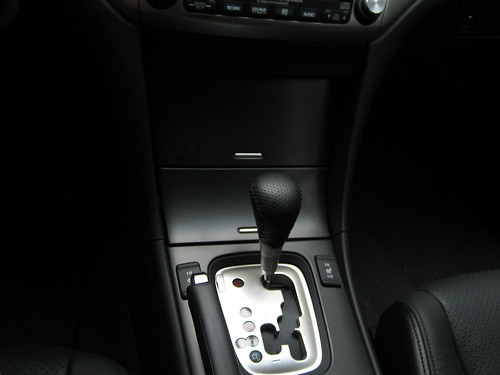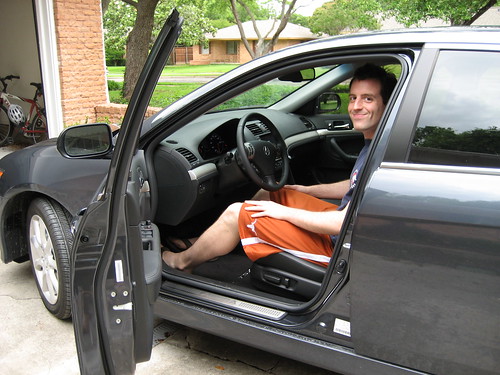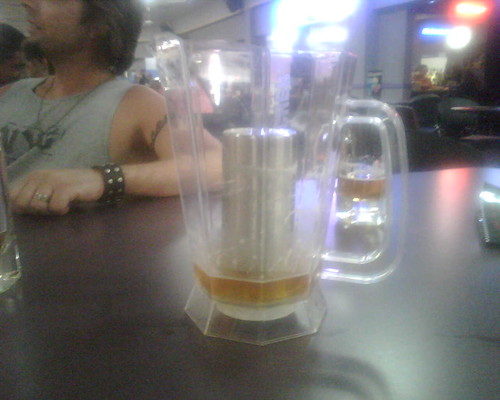Herbert H. Reynolds: 1930-2007.

Baylor University President Ermitus Herbert H. Reynolds passed away last Friday; services are currently taking place. I chose this picture because he's holding a then-bear cub named Chance, whom I used to bottle-feed around that same age and watched grow up into a terror of an animal...just pretty feisty, to say the least. Anyway, Dr. Reynolds was a brilliant psychologist who made historical contributions to not only Baylor, but the scientific community, including NASA. For those Baylor students who don't know, Dr. Reyholds was integral in the Space Race, where he was posted by the U.S. Space Program in New Mexico as the director of research, specifically working on Project Mercury, Gemini, and Apollo for NASA. Actually, he used to have on campus (it might still be there) one of the space suits that the monkeys wore when they were testing them in space. Crazy stuff. Anyway, besides being a 33rd degree Mason (which really creeps me out) and to a little more liberal than many are comfortable with concerning Biblical issues, he was a great scholar and leader for my beloved university.
Reynolds was born March 20, 1930, in Frankston, Texas.
He earned his bachelor's degree from Trinity University in 1952 and completed four years active duty in the U.S. Air Force. After service as a member of a technical advisory group to the Japanese Air Self Defense Force, he came to Baylor in 1956. In 1958, he completed his master's degree in psychology, followed by his doctorate in experimental psychology (neuroscience) and clinical psychology in 1961. During this time he also served as an assistant professor of aerospace studies (1956-59) and a teaching fellow in psychology (1958-61). He remained on active duty in the Air Force during those years to prepare to join the faculty of the Air Force Academy (USAF Institute of Technology sponsorship).
Reynolds had been assigned to the faculty of the Air Force Academy in 1961, but he was diverted to the Aeromedical Research Laboratories at Alamogordo, N.M., where he became deputy commander and director of research. The laboratory was involved in unique research activities associated with the U.S. space program, specifically the Project Mercury, Gemini and Apollo NASA endeavors.
In the midst of producing some 50 publications, Reynolds also served as an adjunct faculty member of both Baylor and the University of New Mexico. After serving several months as the establishing commander and director of plans for the Air Force Human Resources Laboratory, he retired from the Air Force in November 1968, at age 38, having completed 20 years of active duty with four decorations for meritorious service.
In March 1969, Reynolds joined Baylor as executive vice president and, on June 1, 1981, became the university's 11th president. In 1986, he was named one of America's 100 most effective chief executive officers in a study funded by the Exxon Education Foundation of the 3,400 presidents of American colleges and universities. More than $180 million in renovated and new facilities were added at Baylor during his presidency, endowment quadrupled, the total net assets of the university tripled and there was no increase in indebtedness.
In the first five years of his administration, there were a number of special academic initiatives, among them the establishment of the Distinguished Visiting Professors Program and the creation of the Robert Foster Cherry Great Teacher Awards, which provide recognition of some of the world's finest teachers and brings them to Baylor for specific teaching and lecture roles. Others included the designation of Baylor professors as Master Teachers, the highest honor granted to Baylor faculty members, which began under Reynolds in 1982; the designation of 12 Distinguished Professors and the creation of "In-Residence" faculty positions for faculty with unique talents and backgrounds, such as Diplomat-in-Residence, Writer-in-Residence and Organist-in-Residence, with wide latitude in their professorial and professional activities.
By the early 1990s while Reynolds was president, around 15 percent of Baylor's faculty were receiving release time from one or more courses, mini-sabbaticals for six to 12 weeks, or full length sabbaticals from December to August or May to January to carry out research and publication or to engage in other creative pursuits. Teaching remained the highest priority under Reynolds, but there were many opportunities for research and scholarly endeavors. Reynolds also led in the creation of a new university governance system and greatly enhanced the personnel benefits to an amount equal to about 25 percent of an individual's salary.
New facilities under Reynolds, made possible by the gifts of many generous donors, included the Hooper-Schaefer Fine Arts Center and Lewis Art Building, Wiethorn Information Center, Zachariah and Elizabeth Bobo Baptist Student Center, Carlile Geology Research Building, Blume Conference Center, Cashion Academic Center and the Law Advocacy Center. In addition to the new structures, a number of older facilities were partially or completely renovated and the Gov. Bill and Vara Daniel Historic Village was added as the outdoor arm of the Strecker Museum, the oldest museum in Texas.
During Reynolds' presidency, educational and service opportunities for Baylor students were enhanced, including the initiation of "Steppin' Out," which began in 1985 and quickly grew into one of the largest community service projects on an American college campus. Through this program, which still continues to this day, thousands of members of the Baylor family join hands to perform special tasks for those in need in the community. Student organizations were honored each year for their leadership and service contributions in a special ceremony. Baylor debaters took the Southwest Conference crown every year and captured the American Forensics Association National Championships in 1987 and 1989.
Major new facilities added during the 1986-91 period included the Lev and Ella Prichard Athletic Dining Hall; the Follett Building, which provides space for multilevel parking, an expansive bookstore and offices for the Cashier and Student Financial Aid; the Ferrell Center, a 10,000-seat domed special-events facility, which was opened with a visit by then-President Ronald Reagan; the Robert M. and Louise Rogers Engineering and Computer Science Building; the Learning Resource Center at the School of Nursing in Dallas; the Gregory Memorial Garden at the lower level of Moody Library; the co-generation temperature control system designed to reduce utilities cost campus wide; and the Floyd Casey Stadium renovation and expansion, including the construction of the Carl and Thelma Casey Athletic Complex. Nearly all the remaining buildings that had not undergone major renovation in a number of years were remodeled. In addition, the telephone system was significantly enhanced, the computerization of academic and administrative operations was greatly expanded, and Baylor became one of the 25 top "wired" colleges and universities in the nation.
By the end of 1991, Reynolds' first decade as president, 649 new courses and 23 new degree programs had been added to meet the needs of the student body which had increased by 16 percent. Enrollment was approaching 12,000 students, and approximately 10 percent of the student body were preparing for careers in ministry.
Over his last four years as president, Reynolds continued along the path which he had set for guiding Baylor to new heights. The Jesse H. Jones Library and the Glennis McCrary Music Building were added in 1993; the F.L. Carroll Chapel and Library Building, the fourth building constructed on the Waco campus, was restored; and an eight-story office building, the Clifton Robinson Tower, was acquired to provide much-needed space for academic, administrative and student needs. With the support and generosity of special friends of the university, Reynolds worked with the Board of Regents to establish George W. Truett Theological Seminary with its first class of 51 men and women beginning classes the fall of 1994. On Feb. 22, 2002, while Reynolds served as President Emeritus, Baylor officially dedicated the Baugh-Reynolds Campus of Truett Seminary, named after Reynolds and great friend of the university John Baugh.
In collaboration with the faculty, Reynolds continued to create new curriculum opportunities, including several master's and doctoral programs. During this time, Baylor was ranked 72nd out of 235 doctoral-degree granting universities by U.S.News & World Report. Under Reynolds, a total of 757 National Merit Scholars were enrolled and the university ranked in the top one percent of the nation's educational institutions in the number of Scholars enrolling each year. One such scholar was named a Rhodes Scholar in 1989, the third in the history of the institution. From June 1981 through the May 1995 graduation, some 37,500 students received their Baylor degrees, and 86,000 alumni and students resided in all 50 states and 137 foreign countries. The 100,000th graduate of Baylor was honored at the May 1995 Commencement.
Reynolds retired from the Baylor presidency on May 31, 1995, and became Chancellor June 1, 1995. He retired as Chancellor on May 31, 2000, and became President Emeritus June 1, 2000. He received the coveted Baylor Founders Medal in 2000, the Scottish Rite Stephen F. Austin Award in 2000, the prestigious Independent Colleges and Universities of Texas Founders Medal in 2001, and the Association of Fundraising Professionals Lifetime Achievement Award in 2002. In 2003 he was named the Texas Baptist Elder Statesman. Generous benefactors of the university, the Reynolds were inducted into the Baylor University Medallion Fellowship with the Pat Neff medallion in fall 2006.
Reynolds was past chair of the 850-presidential member National Association of Independent Colleges and Universities, as well as the 40 Independent Colleges and Universities of Texas (ICUT). He was chair of the Texas Commission on Judicial Efficiency from 1995-97 and was a member of the Texas Select Committee on Higher Education. In addition, he served as an emeritus trustee of the Baylor College of Medicine, a director of Community Bank and Trust of Waco, and a deacon and former deacon chairman of the First Baptist Church of Waco. He was a 33rd degree Mason, a member of numerous honor, professional and civic organizations, and was also a licensed psychologist.
Reynolds was listed in Who's Who in America, Who's Who in the South and Southwest, Who's Who in Science, Who's Who in Education and was named a Distinguished Alumnus of both Baylor and Trinity. In 1980 he was appointed the first University Professor at Baylor (Psychology/Neuroscience, Organizational Behavior and Higher Education). He was a member of Phi Beta Kappa and held the honorary Doctor of Science (Sc.D.) degree from both the Baylor College of Dentistry and Seinan Gakuin University in Japan, as well as an honorary Doctor of Philosophy (Ph.D.) from Yonok College in Thailand. From 1994-97 he was a Visiting Scholar/Fellow of Wolfson College, Cambridge University. Through the years he gave numerous invited addresses and formal presentations.
Reynolds is survived by his wife, Joy (BA '74), whom he married

















